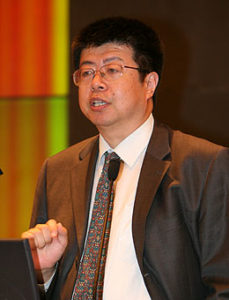 Zhang Yiwu is a postcolonial scholar from the People’s Republic of China, who seeks to develop a theoretical language to describe everyday life in reform era China on its own terms and concerns. Critique of Zhang’s work is available in English, but none of Zhang’s original works have been translated yet.
Zhang Yiwu is a postcolonial scholar from the People’s Republic of China, who seeks to develop a theoretical language to describe everyday life in reform era China on its own terms and concerns. Critique of Zhang’s work is available in English, but none of Zhang’s original works have been translated yet.
In the 1990s, Zhang argued that modernity as a framework of discourse in China, must be overcome in order to enable the Chinese to articulate self-determined visions of a better future. Modernity, for him, is a discourse that limits the imagining of possible futures by tying the future of the formerly colonized to a repetition of developments of the West. This framework is reproduced in China by the (enlightenment) intellectuals since the May Fourth Movement, because these intellectuals are empowered as bearers of modern knowledge, while at the same time spreading this knowledge in society. However, this makes the intellectual desire a modernity outside of their own experience and detached from their own problems. They start to understand their own being in the world through concepts developed for different contexts.
As an alternative, Zhang proposes the ‘marginal intellectual’ as an actor who tries not to educate the masses in order to make them more modern, but who puts the concerns of people’s everyday life into analytic terms. Together with Zhang Fa and Wang Yichuan he suggested ‘Chineseness’ (中华性) – understood as a discourse that emerges from a plurality of voices and rejects any binarization or linear notion of progress – as an alternative to ‘modernity’. In the course of this, he wants to establish a Chinese notion where ‘development’ is understood as a process to envision and reach a self-determined better future.
Zhang’s works mostly emerged from the late-1980s and early-1990s, where he tried to find a discourse that would put into words the new experiences and literary expressions of this time without embracing modernization discourse. He has turned increasingly nationalist in recent years and fiercely attacked ‘traitors’ in the context of debates around Covid-19 in China.
Zhang Yiwu was criticized in China for deconstructing “modernity” but failing to deconstruct “tradition” or the difference of China vs. the West. His notion of “Chineseness” was criticized to be essentialist. For example, the US-based Chinese scholar Xu Ben argued, that Zhang’s notion of Chineseness is a conservative culturalist argument and even shows signs of a Chinese cultural imperialism, because Chineseness is extended over the boundaries of the PRC but, Xu claims, with the PRC in its centre. Also, one may add, Zhang does not explain in detail how the relation between ethnic minorities and Han can be addressed within the framework of ‘Chineseness’.
Essential Reading:
Zhang, Yiwu (1993): 在边缘处追索. 第三世界文化与当代中国文学. Changchun: 时代文艺出版社.
Zhang, Yiwu (1994): 现代性的终结. 一个无法回避的课题. In: 战略与管理1 (3), S. 104–109.
Zhang, Fa; Zhang, Yiwu; Wang, Yichuan (1994): 从“现代性”到“中华性”—新知识型的探寻. In: 文艺争鸣2, S. 10–20.
Further Reading:
Only the critique of Zhang’s work is available in English:
Strafella, Giorgio (2016): Postmodernism as a Nationalist Conservatism? The Case of Zhang Yiwu. In: Asiatische Studien – Études Asiatiques 70 (3), S. 117.
Xu, Ben (1998): “From Modernity to Chineseness”: The Rise of Nativist Cultural Theory in Post-1989 China. In: Positions 6 (1), S. 203–237.
Sheng, Anfeng (2007): Traveling theory, or, transforming theory. Metamorphosis of postcolonialism in China. In: Neohelicon 34 (2), S. 115–136.
Questions:
What is the status of ‘modernity’ in Zhang’s work and why does it need to be challenged?
Why is Zhang critical of the role of the intellectual in Chinese society?
Do you think Zhang’s notion of ‘Chineseness’ is a chance or an obstacle for Zhang’s theory to connect to postcolonial concerns elsewhere in the world?
According to Zhang, why can the Chinese not articulate their own visions of a better future, and how can the Chinese re-appropriate their future?
Submitted by Marius Meinhof
Edited 22/6/21
Image Credit: Baike Baidu
As an African, I feel we are blessed to have Late President Thomas Sankara who wanted to decolonise the continent of Africa. He came before his time and was never very much appreciated until he was killed. He has some of the answers Africa and her peoples were searching for and still searching for to date.
The only way we can immortalize and celebrate the remarkable life of this great son of Africa is to request that one day been set aside for him by the AU as “Sankara Day” observed by all countries in the continent and for our brothers and sisters living in the diaspora.
The killing of Sankara tells us that Africa is still under siege by neo-colonialist forces obsessed with regime change in our continent. Regime change is the new name for imperialism. Africans must resist such unlawful invasion like the one seen in Libya.